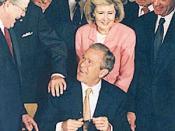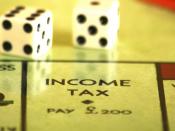Economic Effects of Tax Cuts
Output and Efficiency
Before President Bush took office, his aides began arguing in favor cutting taxes to offset a likely recession. That raises several issues. First, is (or was) there a recession? Although the economy undoubtedly slowed, whether it entered a recession or not remains unclear. Moreover, Johns Hopkins University economist Christopher Carroll has presented evidence suggesting that the administration's rhetoric may, in part, be responsible for declining consumer sentiment and the resulting slowdown in economic activity.
Second, as Bush economic advisers Larry Lindsey and John Taylor have acknowledged in the past, tax policy is a clumsy tool for fine-tuning the economy. Recessions can come and go in the amount of time it takes to implement changes in taxes.
Third, the Bush tax bill would have provided no immediate stimulus and channeled little of the benefit to low- and middle-income families who could be expected to spend the windfall.
Thanks to maneuvering by Congress, the bill was altered so that taxpayers would receive about $40 billion in rebates (technically, advance credits on their 2001 taxes) in the late summer and fall of 2001. But evidence from 1975, the last time taxes were rebated, suggests that only about half of that will be spent, resulting in a stimulus on the order of just 0.2 percent of GDP.
The Bush administration has also asserted that the tax cut will help people pay off credit card debt, and debt reduction is a form of saving. Yet, the President is also counting on the cut as an anti-recessionary device to increase consumption. He can't have it both ways.
The Administration also defends the tax cut with arguments about its long-term effects. Perhaps the most compelling is that lower marginal rates will improve efficiency and increase incentives to work and...


